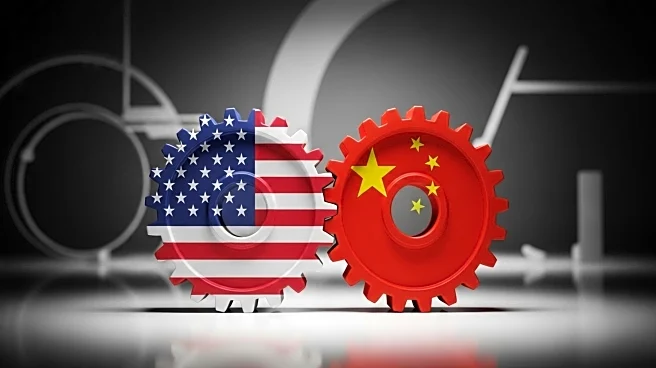What's Happening?
China has issued a warning to the United States, stating it will take countermeasures if President Trump proceeds with his threat to impose 100% tariffs on Chinese goods. This development follows China's recent implementation of export restrictions on rare earth minerals, which are crucial for various industries, including electronics and defense. The Chinese Ministry of Commerce has criticized the U.S. for its unilateral actions and accused it of double standards in trade practices. The ministry highlighted that the U.S. has expanded its export control list to include over 3,000 items, compared to China's list of just over 900. The situation has escalated tensions between the two nations, potentially jeopardizing months of progress in trade negotiations.
Why It's Important?
The imposition of tariffs and export restrictions between the U.S. and China could have significant implications for global industries reliant on rare earth minerals. These minerals are essential for manufacturing electronics, semiconductors, and military equipment. The trade tensions may disrupt supply chains, increase production costs, and lead to higher prices for consumers. Additionally, the strained relations could impact ongoing trade negotiations, affecting economic stability and growth prospects for both countries. Businesses and industries that depend on these materials may face challenges in sourcing alternatives, potentially leading to delays and increased expenses.
What's Next?
If President Trump proceeds with the tariff threat, China is expected to implement countermeasures to protect its interests. This could include further restrictions on exports or additional tariffs on U.S. goods. The situation may prompt diplomatic efforts to resolve the trade dispute and prevent further escalation. Stakeholders, including industry leaders and policymakers, will likely monitor developments closely, assessing the impact on trade relations and economic stability. The outcome of these tensions could influence future trade policies and negotiations between the two nations.
Beyond the Headlines
The ongoing trade tensions between the U.S. and China highlight broader issues of economic nationalism and protectionism. The dispute underscores the complexities of global trade, where national security concerns often intersect with economic interests. The situation may lead to a reevaluation of supply chain dependencies and encourage diversification of sources for critical materials. Additionally, the conflict raises questions about the long-term sustainability of current trade practices and the need for international cooperation to address economic challenges.











